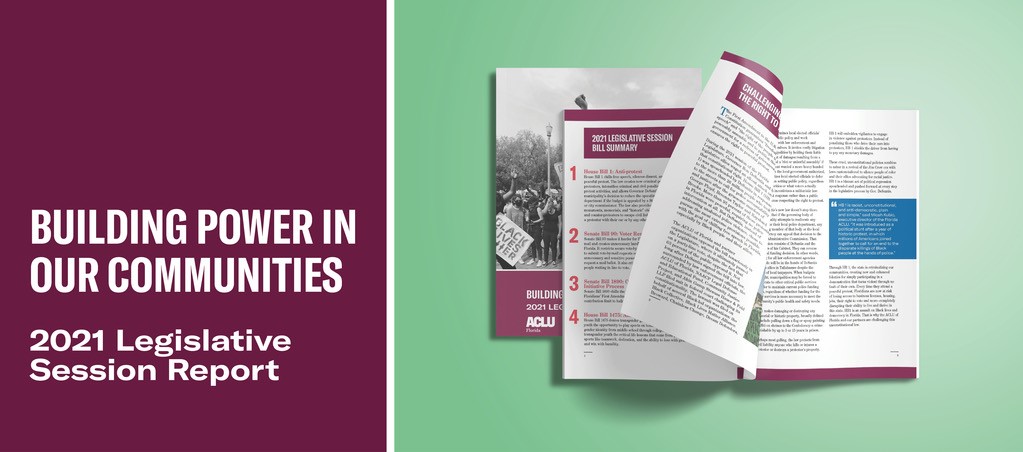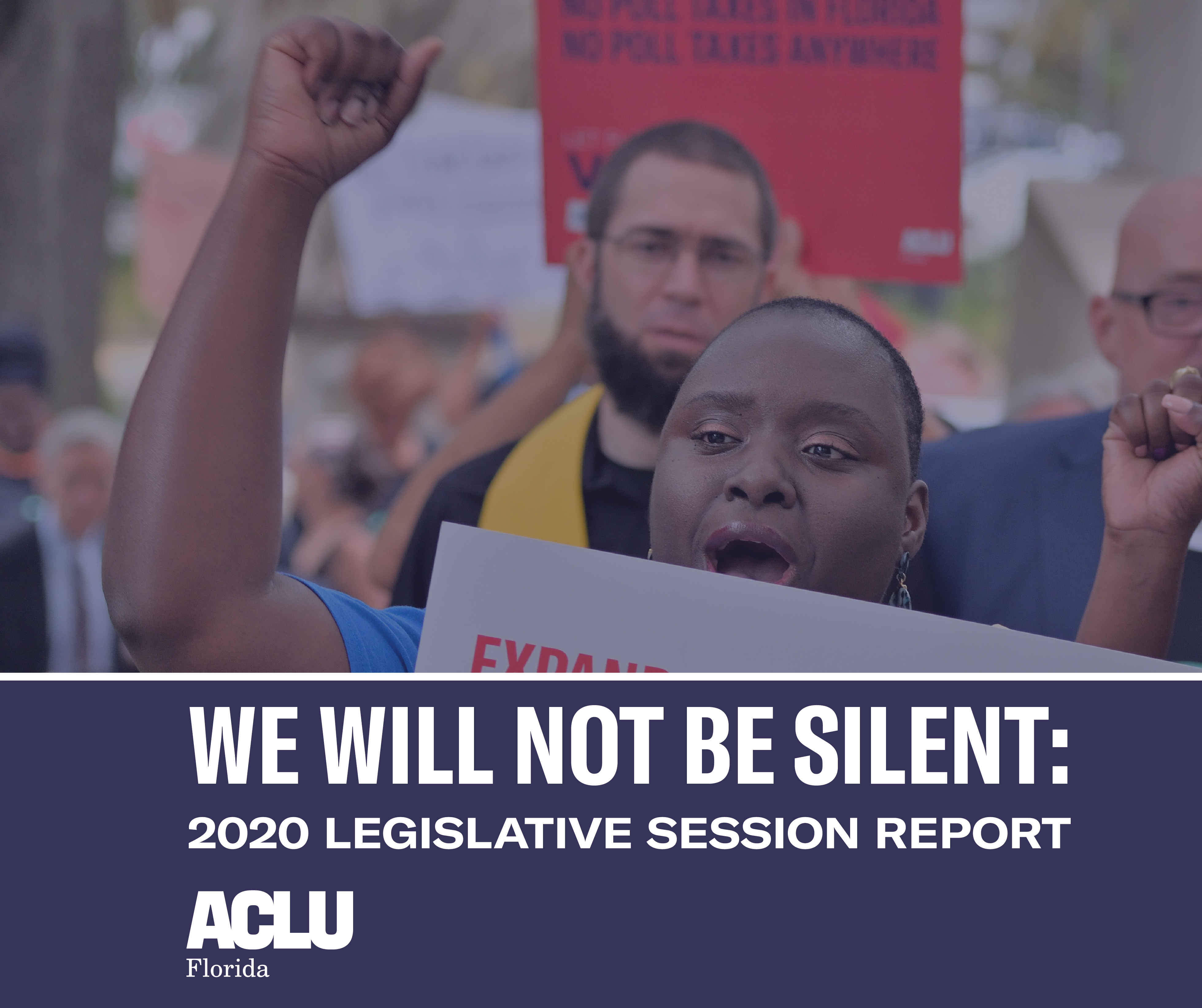More than 4.5 million Floridians, 21% of the population, were born in another country. Nearly half are not naturalized U.S. citizens. They are our neighbors, our colleagues, our friends. They have been targeted by anti-immigrant rhetoric and policies at the local and state level.
While the country has been confronted with the harsh consequences of this rhetoric, Florida remains firmly in the Trump era as its political leaders continue to build their legacies on the backs of immigrants. With the 2020 presidential election, many of the Trump Administration’s cruelest policies have been rolled back. While progress is being made on the national front, our country has a long way to go to correct the injustices of a broken immigration system. Florida’s political leaders, meanwhile, continue to push harmful narratives painting immigrants as criminals and actively engaging in unnecessarily cruel anti-immigrant actions, such as sending state resources to the Texas-Mexico border. Local governments still have the authority – and responsibility – to serve and protect their communities without regard to citizenship status.
To mitigate against the harms of forced participation in federal immigration detention and deportation efforts, local governments must adopt policies that:
Limit Warrantless Detention: Local governments do not have to have a 287(g) agreement with ICE to comply with state law. They do have a duty to serve their communities and prioritize local public safety concerns over political rhetoric. They can do this by reducing entanglement with federal immigration enforcement, preserving local policing resources to address localcrime, and protecting their communities by proactively adopting policies that standardize any immigration enforcement activities they feel they must perform under the law.
Increase Transparency and Accountability: Being transparent with the public is an essential part of law enforcement. State law requires cities and counties to participate in federal immigration detention efforts, but they should do this transparently, not secretively.
Prohibit Discrimination: Too often, local police wrongfully detain U.S. citizens and legal permanent residents without probable cause, simply based on how they look or speak. We need to protect the civil liberties of Floridians and make sure our friends and neighbors are not unfairly targeted or discriminated against.
Protect Public Safety: If immigrants either witness a crime, or are victims of a crime, but feel too afraid to report it to local law enforcement because they are worried they’ll be deported, everyone loses. If we want our communities to be safer, then we have to make sure everyone can safely report criminal activity to the police.
Protect Civil Liberties: Less than half of the people facing deportation cases in Florida have legal representation. Because undocumented immigration is not a crime, immigrants, even children, do not have a right to an attorney. Local governments can partner with legal aid foundations and reputable law firms to ensure immigrants have the legal advice necessary to navigate our incredibly complex immigration system.
Date
Friday, November 5, 2021 - 5:00am
Show featured image
Hide banner image
Related issues
Immigrants' Rights
Documents
Show related content
Tweet Text
[node:title]
Type
Menu parent dynamic listing
Show PDF in viewer on page
Style
Centered single-column (no sidebar)
Show list numbers
Over the last year, we rode an emotional, economic, and healthcare roller coaster together. We experienced loss throughout the COVID pandemic and at the hands of the police. We also experienced a dangerous, white supremacist insurrection at the U.S. Capitol spurred by former President Trump and lawmakers who refused to acknowledge the results of the 2020 presidential election.
We dealt with fundamental attacks on our democracy in legislatures across the country, including in Florida. Over the course of 60 days, Gov. Ron DeSantis and his allies forced through laws that criminalize peaceful protesters and shield counter-protesters from civil liability for killing or injuring a demonstrator. They also enacted voter suppression schemes that will make it harder for Floridians to vote by mail and will disproportionately impact Black, elderly, mobility-impaired, student and veteran voters; and they callously discriminated against transgender girls by banning them from playing on sports teams that align with their gender identity.
The cruelty we witnessed during the 2021 legislative session highlights the fundamental disconnect between Florida elected officials and the people. The more that Floridians express and champion their ideals, the more politicians in Tallahassee work to enact legislation to undermine the power of our communities.
What we know at the ACLU of Florida is that, in these challenging times, our work is more critical and necessary than ever, and it may be some of the most important work we have engaged in over the last decade. This work includes engaging directly with communities closest to the issues and reimagining solutions to the problems that plague our state. It also includes strategizing daily with our partners and stakeholders to empower people to make their voices heard, to change the civil liberties landscape in Florida, and make our state truly a place where all Floridians can thrive.
We saw firsthand over the 60-day legislative session how much Floridians care about improving and advancing our democracy. Despite all efforts to thwart our voices, the commitment in our communities to change the political and social landscape of Florida is stronger than ever and will prevail.
The 2021 Florida legislative session created more challenges than solutions, but the movement continues undeterred. We will not stop until Florida is a place of opportunity for all. Along with our supporters and partners, we will continue to work toward and achieve a Florida we can all believe in.
2021 Legislative Report: Building Power in our Communities
Date
Tuesday, June 8, 2021 - 1:15pm
Featured image
Show featured image
Hide banner image
Override default banner image
Related issues
Voting Rights
Students & Youth Rights
LGBTQ+ Rights
Racial Justice
Police Practices
Criminal Justice
Free Speech
Gender Equity & Reproductive Freedom
Documents
Show related content
Tweet Text
[node:title]
Share Image
Type
Menu parent dynamic listing
Show PDF in viewer on page
Style
Centered single-column (no sidebar)
Show list numbers
None of us could have predicted a few weeks ago that we would be facing a global pandemic. During this unprecedented time, we are doing everything in our power to ensure that our civil liberties, especially for the most vulnerable among us, are not forgotten. Although there are surely some who wish that the pandemic would end the scrutiny of their records, or result in lowered levels of transparency and accountability, we will not be silent.
In these challenging times, our work continues.
As each of us wrestles with our anxieties and fears about COVID-19, we are reminded of how closely connected we are to one another through our immediate communities and across the globe. We are also reminded how important it is to continue fighting — in the courts, in the legislature, and in communities — to advance all of our rights and freedoms. Because of supporters like you, we are built for moments like this, and we will continue to be propelled forward by the principles that have guided us for the last 100 years. The 2020 Legislative Session may be over, but our work continues.
Date
Thursday, April 16, 2020 - 3:45pm
Featured image
Show featured image
Hide banner image
Related issues
Criminal Justice
Voting Rights
Immigrants' Rights
LGBTQ+ Rights
Gender Equity & Reproductive Freedom
Students & Youth Rights
Documents
Show related content
Pinned related content
2020 Legislative Session Priorities
Tweet Text
[node:title]
Share Image
Type
Menu parent dynamic listing
Show PDF in viewer on page
Style
Standard with sidebar
Pages

